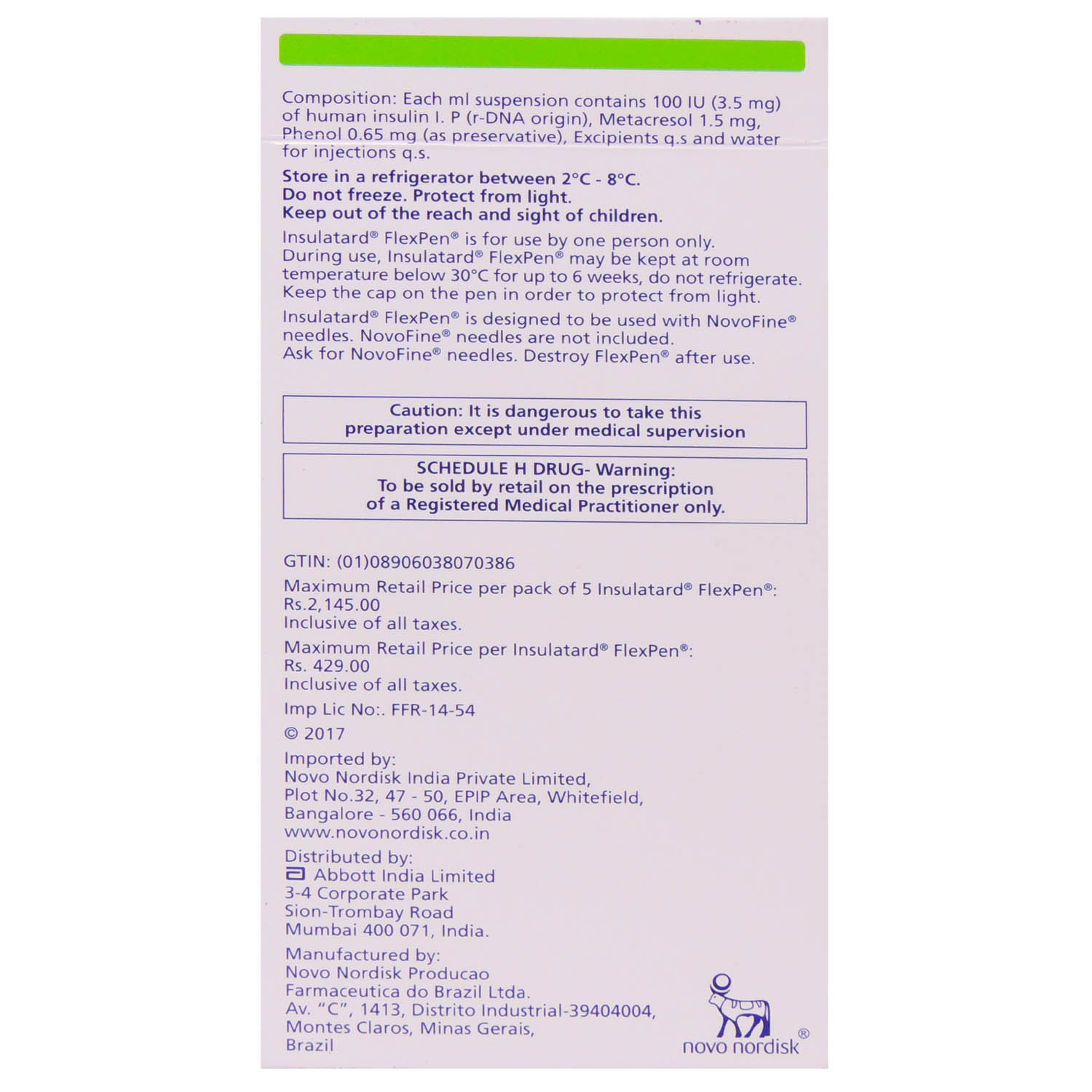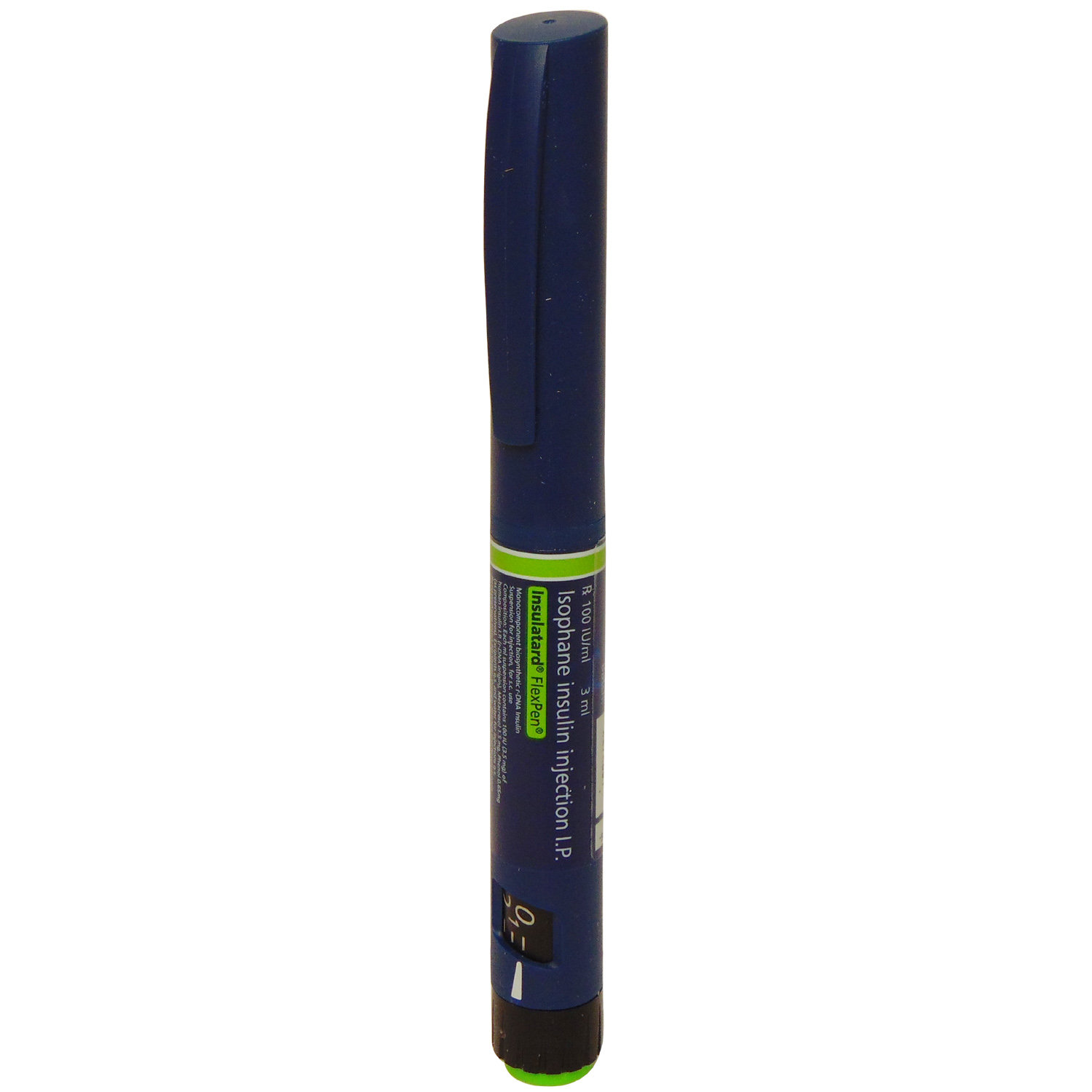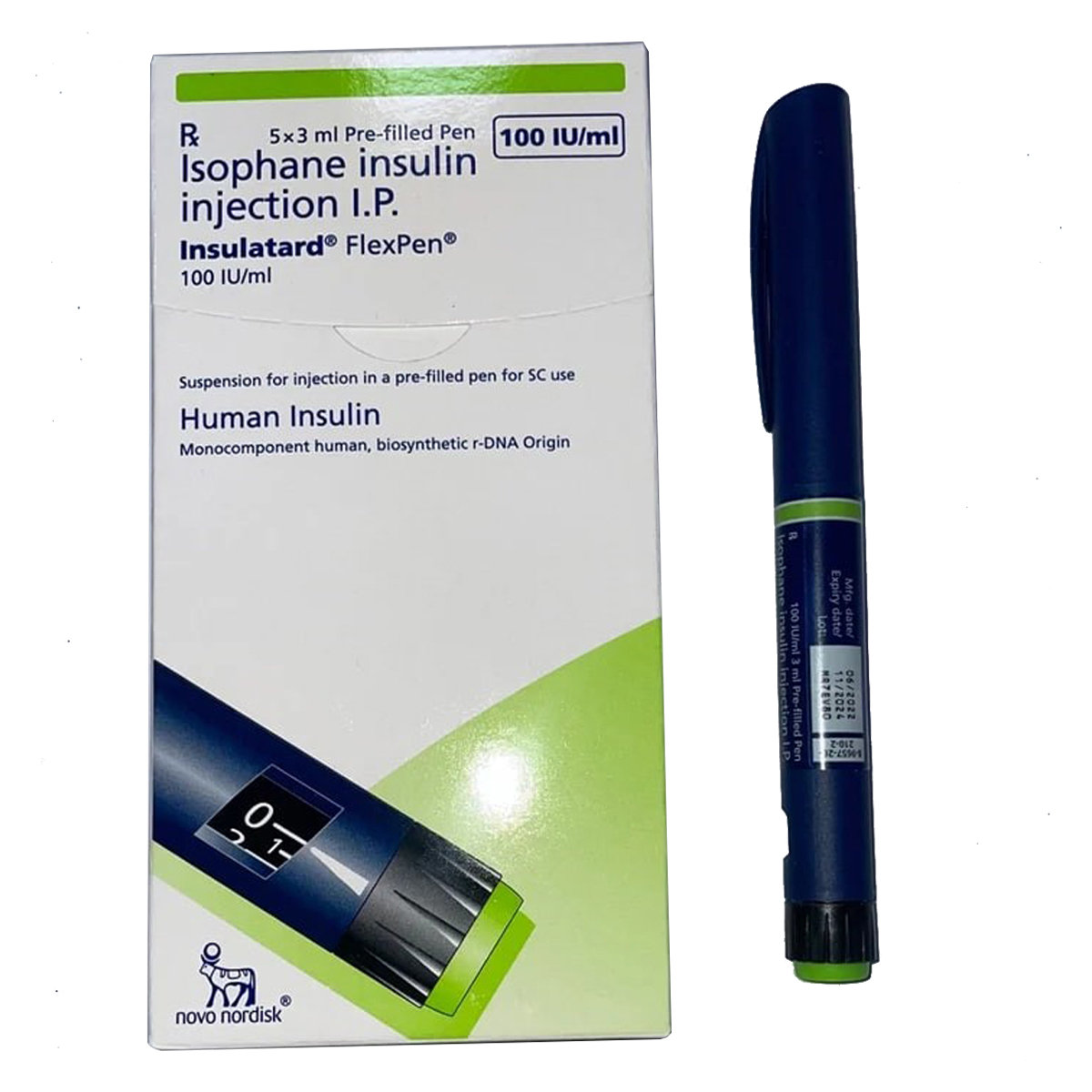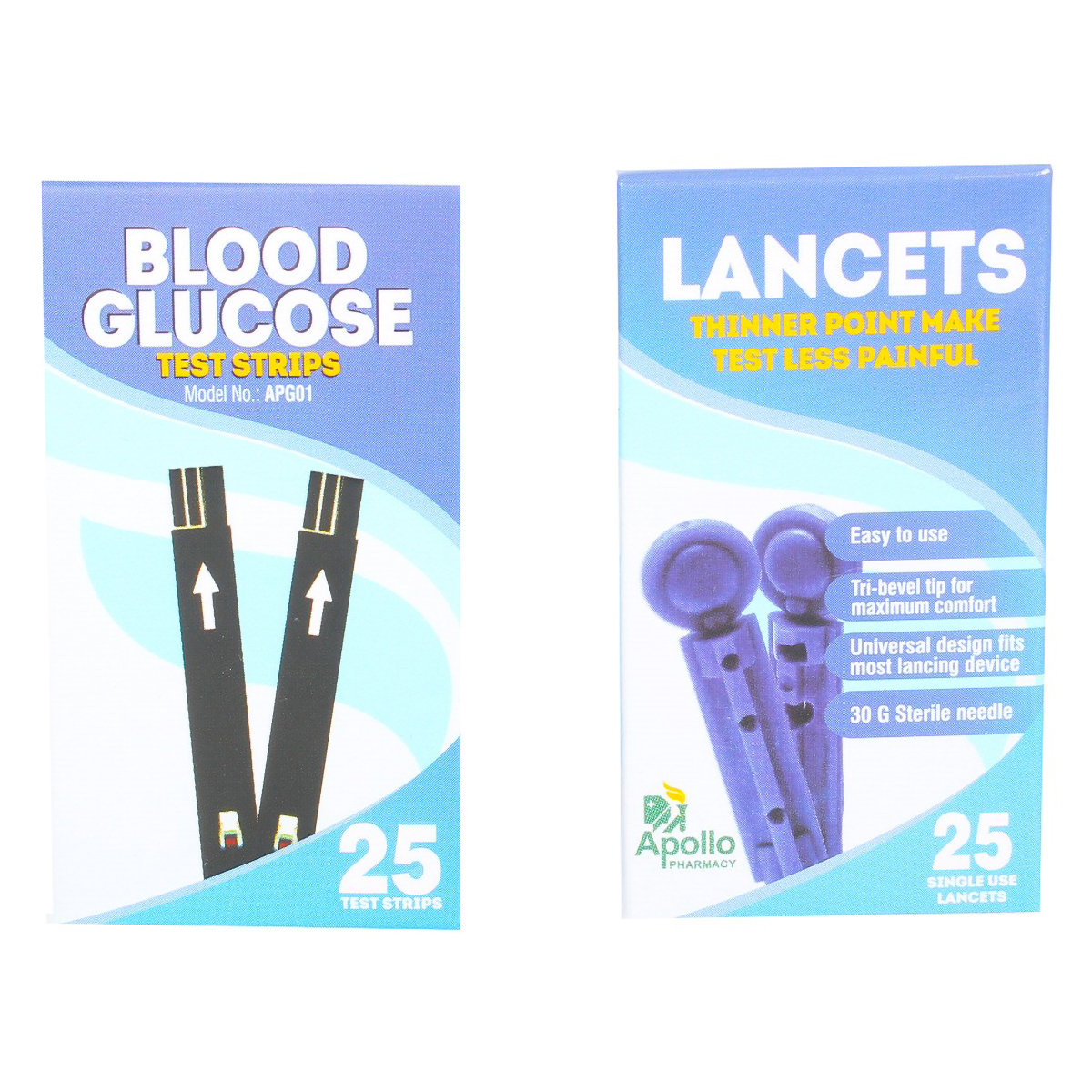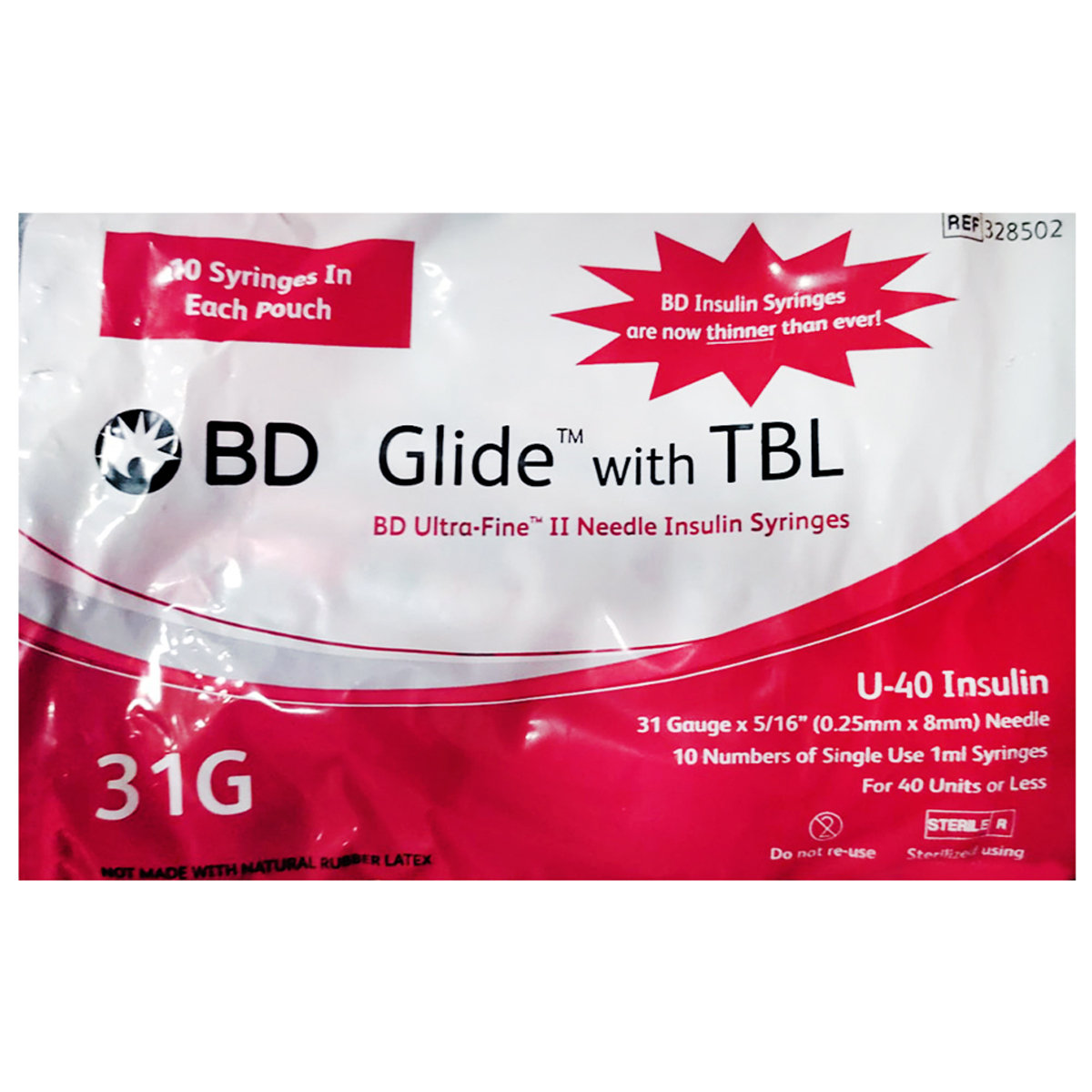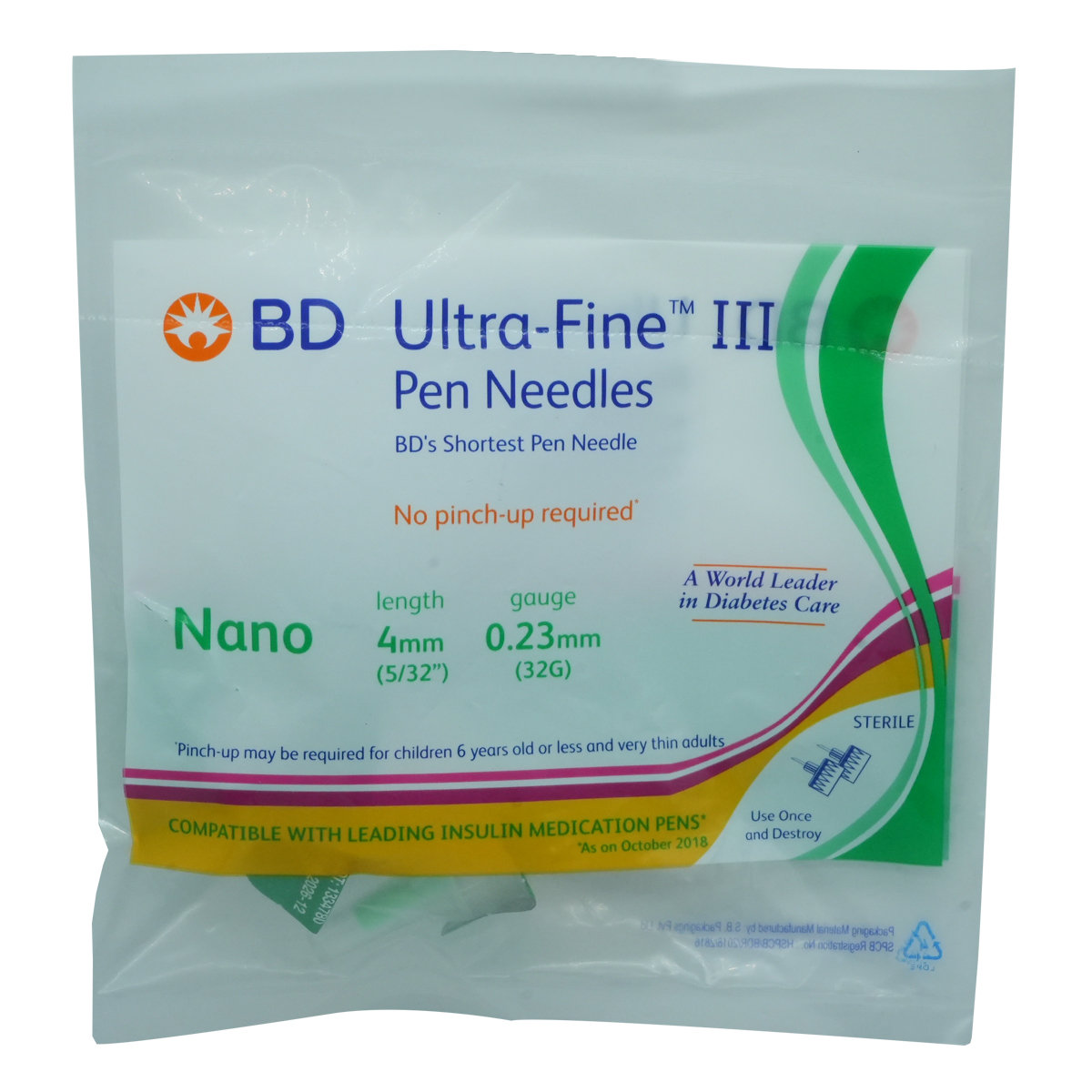Insulatard 100IU Flexipen 3 ml
MRP ₹626.5
(Inclusive of all Taxes)
₹94.0 Cashback (15%)
Provide Delivery Location

secured payment

india's most trusted pharmacy

genuine products
Composition :
Manufacturer/Marketer :
Consume Type :
Expires on or after :
Return Policy :
About Insulatard 100IU Flexipen 3 ml
Insulatard 100IU Flexipen 3 ml contains human insulin, used to improve blood sugar control in adults and children with type 1 and type 2 diabetes mellitus. It maintains blood sugar levels in both adults and children. Diabetes mellitus is a condition that affects the way your body processes glucose. In Diabetes Mellitus Type 1, the body does not make enough insulin to control blood sugar levels. In Diabetes Mellitus type 2, either the body stops producing enough insulin (the hormone which helps to decrease sugar levels in the blood) or there is resistance to the action of insulin. As a result, insulin is produced in large amounts but it is not able to act on the organs of the body.
Insulatard 100IU Flexipen 3 ml works by ensuring rapid and consistent sugar control. Insulatard 100IU Flexipen 3 ml is a fast-acting type of insulin which helps to decrease blood sugar levels after the intake of meals. It prevents the chances of developing serious complications of diabetes. It facilitates the reuptake of sugar in muscle and fat cells and thus, suppresses the production of sugar in the liver.
Your doctor will advise you on how to use this medicine. It is advised to get it administered by a healthcare professional. It should be taken 15 minutes prior to the meal or within 20 minutes after you start having a meal. In some cases, you may experience injection site reactions like redness or swelling. Some people gain weight while taking insulin. You may also experience symptoms of hypoglycemia such as cold sweat, cool pale skin, nervousness or tremor, anxious feeling, unusual tiredness or weakness, confusion, difficulty in concentration, drowsiness, excessive hunger, temporary vision changes, headache, nausea and palpitation. Most of these side effects of Insulatard 100IU Flexipen 3 ml do not require medical attention and gradually resolve over time. However, if the side effects are persistent, reach out to your doctor.
Try not to stop taking this medicine of your own. Let your doctor know about this, as it may cause withdrawal symptoms. Do not take this medicine if you have any low blood glucose levels, kidney, liver or heart problems or problems with alcohol or other prescription recreational drugs. Along with this medicine, you should take a healthy diet, do regular exercise and maintain weight as advised by your doctor. Insulatard 100IU Flexipen 3 ml is a cold chain medicine and so it has to be stored in the refrigerator between 2-8 degrees Celsius else its efficiency may be lost. Do not store in the freezer of the refrigerator.
Uses of Insulatard 100IU Flexipen 3 ml

Have a query?
Directions for Use
Insulatard 100IU Flexipen 3 ml should never be administered intravenously (into the vein). It is administered subcutaneously in the abdomen or thigh region. Take Insulatard 100IU Flexipen 3 ml as advised by the doctor. If you are not well trained to self-administer Insulatard 100IU Flexipen 3 ml, ask a healthcare professional to administer it.
Key Benefits
When you take Insulatard 100IU Flexipen 3 ml, it works by ensuring rapid and consistent sugar control. It facilitates the reuptake of sugar in muscle and fat cells and thus, suppresses the production of sugar in the liver. It helps to decrease blood sugar levels after the intake of meals. It prevents the chances of developing serious complications of diabetes. Besides this, Insulatard 100IU Flexipen 3 ml can be safely prescribed to the diabetic mother in the pregnancy as well as lactation stage. Insulatard 100IU Flexipen 3 ml helps in improving the glycaemic control which in turn decreases the risk of progression of complications of diabetes like damage of retina (retinopathy), damage of kidney (nephropathy), damage of nerve cells (neuropathy), delayed wound healing, diabetic foot ulcer and others.
- If you experience low blood sugar levels, inform your doctor. They will assess the severity and make recommendations for the next actions.
- Your doctor will assess your symptoms, blood sugar levels, and overall health before recommending the best course of action, which may include treatment, lifestyle modifications, or prescription adjustments.
- Follow your doctor's instructions carefully to manage the episode and adjust your treatment plan.
- Make medication adjustments as recommended by your doctor to prevent future episodes.
- Implement diet and lifestyle modifications as your doctor advises to manage low blood sugar levels.
- Monitor your blood sugar levels closely for patterns and changes.
- Track your progress by recording your blood sugar levels, food intake, and physical activity.
- Seek further guidance from your doctor if symptoms persist or worsen so that your treatment plan can be revised.
Drug Warnings
Insulatard 100IU Flexipen 3 ml is for subcutaneous use only and should never be administered intravenously (IV) or in the veins. If you are changing the brand of insulin, it should be done under strict medical supervision. Cases of heart failure have been reported when pioglitazone was used with insulin especially in patients who are at high risk of cardiac heart failure. The first symptoms of hyperglycaemia (high blood sugar level) may include symptoms like excessive thirst, dry mouth, increased frequency of urination, nausea, vomiting, drowsiness, flushed dry skin, loss of appetite and acetone odour of breath. You should closely monitor these symptoms. Symptoms like heart failure, weight gain and oedema (fluid deposition in tissue) should not be overruled. You are recommended not to consume alcohol as it may increase or decrease your blood glucose level. Care should be taken when you are traveling across more than 2 time zones. Your doctor may adjust your insulin schedule. Insulatard 100IU Flexipen 3 ml may decrease level of potassium leading to state of hypokalaemia that, if left untreated, may lead to respiratory paralysis, irregular heartbeat rhythm, coma and even death. Do not take this medicine if you have any low blood glucose levels, kidney, liver, or heart problems, or problems with alcohol or other prescription recreational drugs.
Drug-Drug Interactions
Drug-Drug Interactions
Login/Sign Up
Taking Insulatard 100IU Flexipen 3 ml with trovafloxacin affects blood glucose levels, which may cause hyperglycemia (high blood sugar) and hypoglycemia (low blood sugar) less frequently.
How to manage the interaction:
Although taking trovafloxacin and Insulatard 100IU Flexipen 3 ml together can possibly result in an interaction, it can be taken if your doctor has prescribed it. However, consult the doctor immediately if you experience hypoglycemia or hyperglycemia. Symptoms of hypoglycemia include headache, dizziness, drowsiness, nervousness, confusion, shaking, nausea, loss of hunger, weakness, sweating, palpitations, and rapid heartbeat. Symptoms of hyperglycemia may include increased thirst, increased hunger, and increased urination. Do not stop using any medications without first talking to your doctor.
Taking Insulatard 100IU Flexipen 3 ml with cinoxacin affects blood glucose levels, which may cause hyperglycemia (high blood sugar) and hypoglycemia (low blood sugar) less frequently.
How to manage the interaction:
Although taking Cinoxacin and Insulatard 100IU Flexipen 3 ml together can possibly result in an interaction, it can be taken if your doctor has prescribed it. However, consult the doctor immediately if you experience hypoglycemia or hyperglycemia. Symptoms of hypoglycemia include headache, dizziness, drowsiness, nervousness, confusion, shaking, nausea, loss of hunger, weakness, sweating, palpitations, and rapid heartbeat. Symptoms of hyperglycemia may include increased thirst, increased hunger, and increased urination. Do not stop using any medications without first talking to your doctor.
Taking Insulatard 100IU Flexipen 3 ml with ciprofloxacin effects blood glucose levels, which may cause hyperglycemia (high blood sugar) and hypoglycemia (low blood sugar) less frequently..
How to manage the interaction:
Although taking ciprofloxacin and Insulatard 100IU Flexipen 3 ml together can possibly result in an interaction, it can be taken if your doctor has prescribed it. However, consult the doctor immediately if you experience headache, dizziness, drowsiness, nervousness, confusion, shaking, nausea, loss of hunger, weakness, sweating, and rapid heartbeat, increased thirst, increased hunger, and increased urination. Do not stop using any medications without talking to a doctor.
Taking Insulatard 100IU Flexipen 3 ml with gemifloxacin affects blood glucose levels, which may cause hyperglycemia (high blood sugar) and hypoglycemia (low blood sugar) less frequently.
How to manage the interaction:
Although taking Gemifloxacin and Insulatard 100IU Flexipen 3 ml together can possibly result in an interaction, it can be taken if your doctor has prescribed it. However, consult the doctor immediately if you experience hypoglycemia or hyperglycemia. Symptoms of hypoglycemia include headache, dizziness, drowsiness, nervousness, confusion, shaking, nausea, loss of hunger, weakness, sweating, palpitations, and rapid heartbeat. Symptoms of hyperglycemia may include increased thirst, increased hunger, and increased urination. Do not stop using any medications without first talking to your doctor.
Taking Insulatard 100IU Flexipen 3 ml with enoxacin affects blood glucose levels, which may cause hyperglycemia (high blood sugar) and hypoglycemia (low blood sugar) less frequently.
How to manage the interaction:
Although taking Enoxacin and Insulatard 100IU Flexipen 3 ml together can possibly result in an interaction, it can be taken if your doctor has prescribed it. However, consult the doctor immediately if you experience hypoglycemia or hyperglycemia. Symptoms of hypoglycemia include headache, dizziness, drowsiness, nervousness, confusion, shaking, nausea, loss of hunger, weakness, sweating, palpitations, and rapid heartbeat. Symptoms of hyperglycemia may include increased thirst, increased hunger, and increased urination. Do not stop using any medications without first talking to your doctor.
Taking Insulatard 100IU Flexipen 3 ml with nalidixic acid affects blood glucose levels, which may cause hyperglycemia (high blood sugar) and hypoglycemia (low blood sugar) less frequently.
How to manage the interaction:
Although taking Nalidixic acid and Insulatard 100IU Flexipen 3 ml together can possibly result in an interaction, it can be taken if your doctor has prescribed it. However, consult the doctor immediately if you experience hypoglycemia or hyperglycemia. Symptoms of hypoglycemia include headache, dizziness, drowsiness, nervousness, confusion, shaking, nausea, loss of hunger, weakness, sweating, palpitations, and rapid heartbeat. Symptoms of hyperglycemia may include increased thirst, increased hunger, and increased urination. Do not stop using any medications without first talking to your doctor.
Drug-Food Interactions
Drug-Food Interactions
Login/Sign Up
Diet & Lifestyle Advise
Exercise may lower your body’s need for insulin during and for some time after the physical activity.
Exercise may also speed up the effect of an insulin dose, especially if the exercise involves the area of injection site (for example, the leg should not be used for injection just prior to running).
Discuss with your doctor how you should adjust your insulin regimen to accommodate exercise.
Avoid eating sugar food and prefer food cooked food low in calories.
When traveling across more than 2 time zones, you should talk to your doctor concerning adjustments in your insulin schedule.
Habit Forming
Therapeutic Class
All Substitutes & Brand Comparisons
RX
Human Insulatard Pen 3 ml
Novo Nordisk India Pvt Ltd
₹424.5
(₹141.5/ 1ml)
32% CHEAPER
Alcohol
Safe if prescribed
You are recommended not to consume alcohol along with Insulatard 100IU Flexipen 3 ml to avoid unpleasant side-effects. Alcohol may either decrease or increase the blood sugar level which can be fatal.
Pregnancy
Consult your doctor
Please inform your doctor if you are pregnant as a dose adjustment may be required. The amount of insulin you need usually falls during the first three months of pregnancy and increases for the remaining six months.
Breast Feeding
Consult your doctor
Please inform your doctor if you are breastfeeding as a dose adjustment may be required.
Driving
Safe if prescribed
Drive with caution, Insulatard 100IU Flexipen 3 ml usually causes drowsiness and affects driving ability. Your ability to concentrate and react may be reduced if you have hypoglycaemia (low blood sugar).
Liver
Consult your doctor
Insulatard 100IU Flexipen 3 ml to be taken with caution, especially if you have a history of liver diseases/conditions. The dose may have to be adjusted by your doctor.
Kidney
Consult your doctor
Insulatard 100IU Flexipen 3 ml to be taken with caution, especially if you have a history of kidney diseases/conditions. The dose may have to be adjusted by your doctor.
Children
Safe if prescribed
Insulatard 100IU Flexipen 3 ml can be given safely to children provided, dose has to be prescribed by a child specialist.
FAQs
If you use more than recommended dose of Insulatard 100IU Flexipen 3 ml, your blood sugar may become low (you feel dizzy and drowsy). Please inform your doctor immediately and do as advised to avoid any unpleasant side effect.
If you use less Insulatard 100IU Flexipen 3 ml than you should, your blood sugar levels may increase. Please check your blood sugar. And also, do not inject a double dose to make up for a forgotten/missed dose.
Yes, Insulatard 100IU Flexipen 3 ml can cause oedema (e.g. swelling in arms, ankles; fluid retention), specially at the start of insulin therapy or during a change in therapy to improve control of your blood glucose. If it persists, please consult your doctor.
Insulatard 100IU Flexipen 3 ml can be given to treat both the condition of type 1 and type 2 diabetes mellitus. However, your doctor will decide whether Insulatard 100IU Flexipen 3 ml can be given to you or not depending on your present condition. Insulatard 100IU Flexipen 3 ml should be avoided in patients who are allergic to Insulatard 100IU Flexipen 3 ml or other forms of insulin. It should be avoided in patients suffering from low potassium level (hypokalemia), moderate to severe kidney disease or liver disease. Inform doctor if you are pregnant or breastfeeding.
Insulatard 100IU Flexipen 3 ml shows its effect within half an hour after you take it. It shows maximum effect between 1-4 hours after you take and its effects lasts up to 24 hours. But the effect may change from person to person, consult your doctor for further information.
Insulatard 100IU Flexipen 3 ml is a cold chain medicine which has to be stored 2-8 degree celsius only else its efficiency of reducing blood glucose level declines. Do not keep inside the freezer. So, if it is not stored between 2-8 degree celsius its efficiency may decrease.
Yes, you should inform your doctor before travelling specially when travelling to a different time zone as dose adjustment may be required.
Insulatard 100IU Flexipen 3 ml should not given into the veins or intravenously (IV) route. It should be only administered in the subcutaneous region below the skin. Abdomen regions (stomach) is the best site for the injecting Insulatard 100IU Flexipen 3 ml. However, you can also inject Insulatard 100IU Flexipen 3 ml in the upper arm, or thigh region, as suggested by your doctor.
Yes. Prolonged administration of Insulatard 100IU Flexipen 3 ml may lower your potassium level. So, close monitoring of potassium level is required. So, it is advisable to have regular medical test of potassium level.
Country of origin
Manufacturer/Marketer address
Disclaimer
Keep Refrigerated. Do not freeze.Prepaid payment required.


